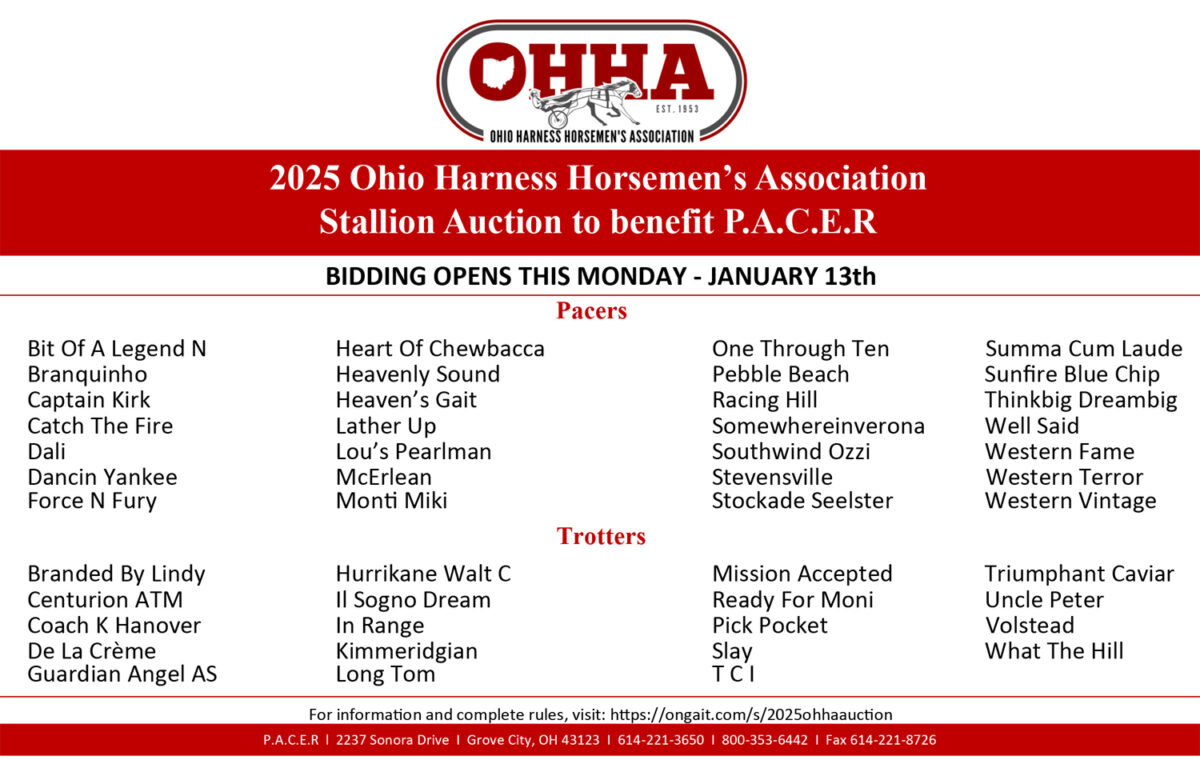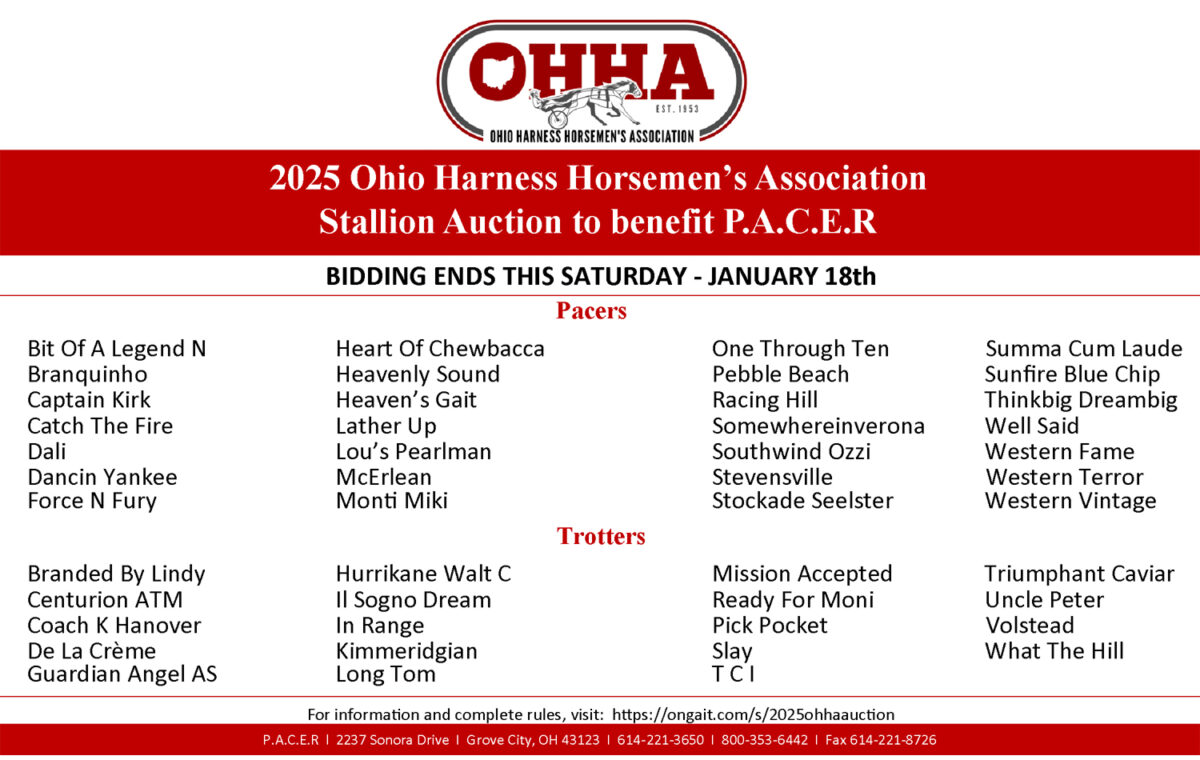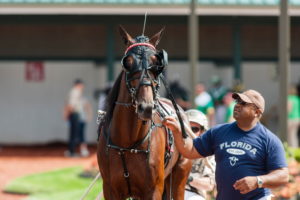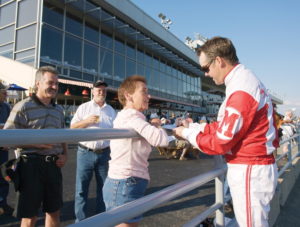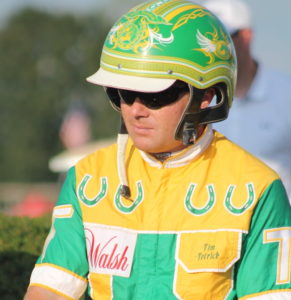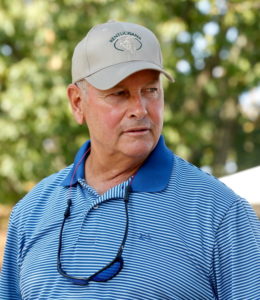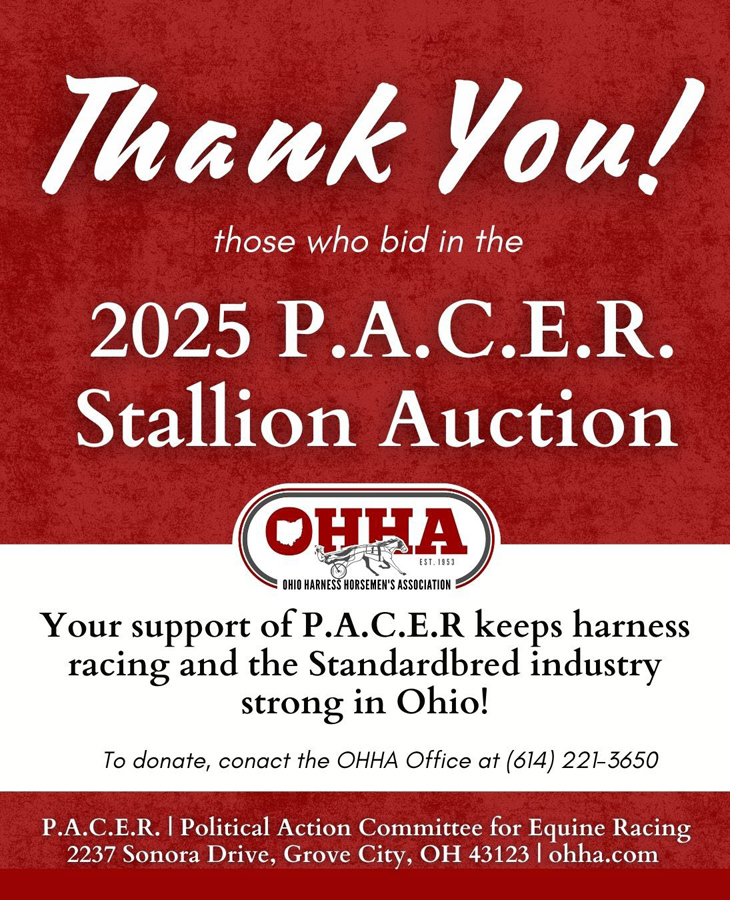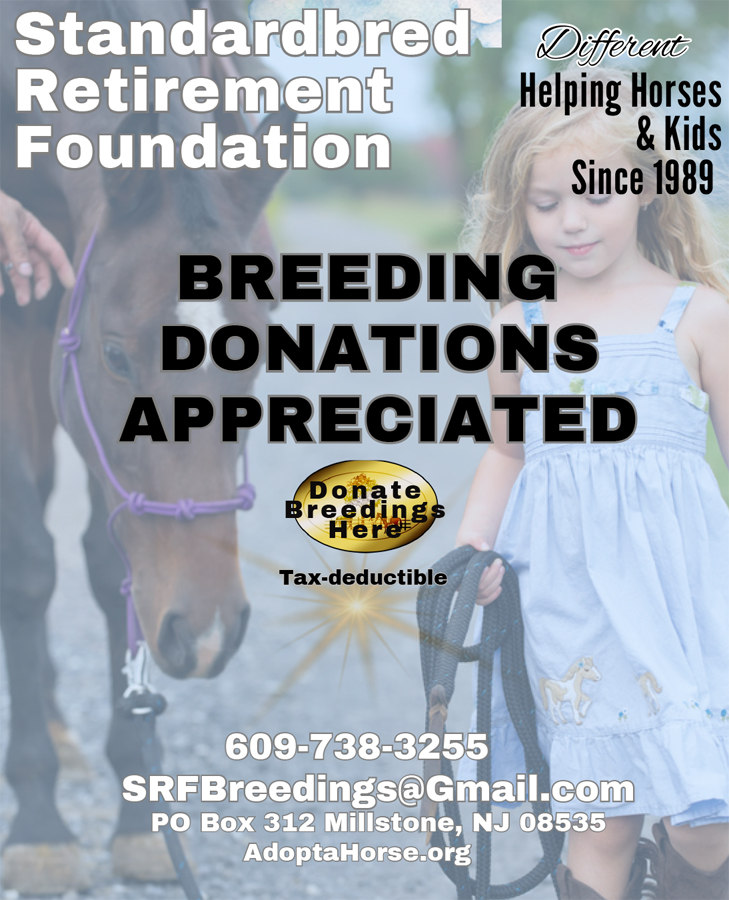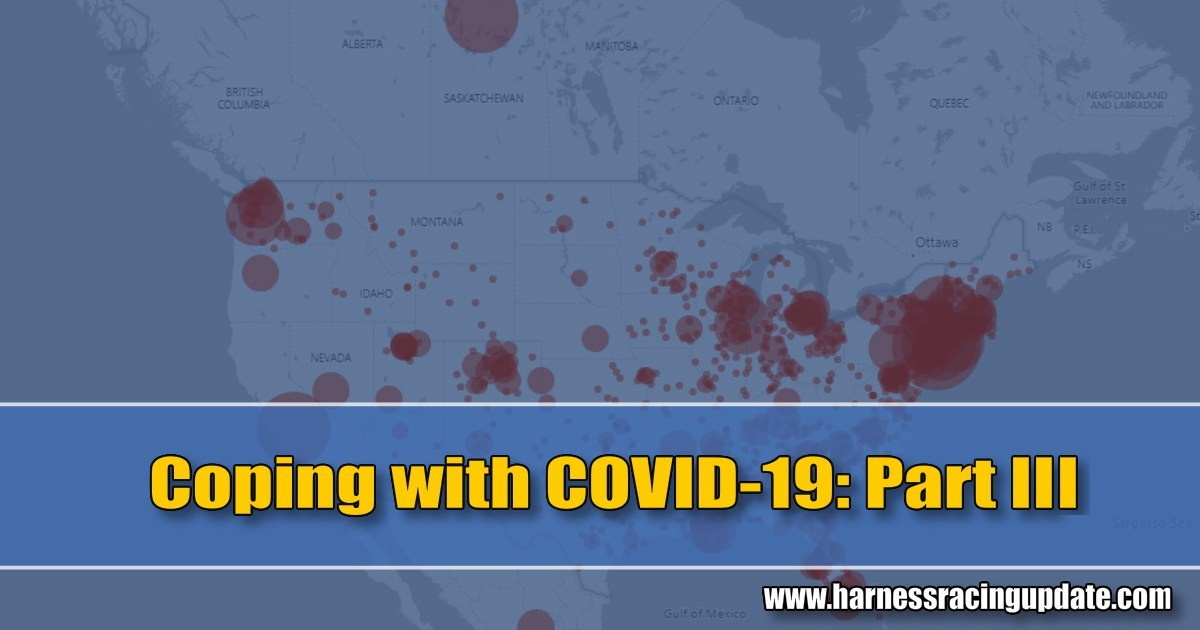
Coping with COVID-19, Part III
The continuation of individual industry stories and thoughts from the front lines in North America.
by Dave Briggs
*Illinois comments by Neil Milbert
Harness Racing Update asked a wide number of people in the harness racing industry to share their personal stories and thoughts about coping with COVID-19. Most of the responses were published March 20 (Part I here), but a few more responses came in that we published on March 22 (Part II here)
Here are more individual stories from across North America.
Each person was asked the following questions:
1. Where are you located right now and how are you and your family coping with the COVID-19 situation?
2. What is the situation like in your area?
3. How has it impacted your work in the industry, so far, and what are you most concerned about in the weeks and months ahead?
4. This is an industry big on hope and helping others. What suggestions can you offer for how people can help others in the industry through this crisis?
5. Where do you see the harness racing industry in 2-3 months?
We thank everyone for taking the time to respond.
DELAWARE
George Teague / Trainer/Owner/Breeder
1. Where are you located right now and how are you and your family coping with the COVID-19 situation?
I am in between my farm at Harrington and the racetrack at Harrington Delaware.
2. What is the situation like in your area?
We are definitely paranoid so that helps us cope with this a lot better than most… . Nobody close around us, as far as I know, has tested positive or showed any signs of the coronavirus. For now we seem to be in a lucky area, but not backing off of practicing common sense survival skills.
3. How has it impacted your work in the industry, so far, and what are you most concerned about in the weeks and months ahead?
We still have to function because we own horses and they have to be taken care of. But pretty much shut down jogging and training right now. Unfortunately I hope I don’t get too far behind trying to guess when we will start back up racing. At the racetrack there is just one guy working the track and kind of overseeing everything. But we are in good shape there. He’s a good guy to have around working the track. But back at my farm we’re pretty much cleaning stalls and grooming the horses but no track work.
I’m like everybody else I think that we are most concerned about how are we going to survive economically without income? I’m probably in worse shape than most because I got quite a few horses so feeding and buying hay is always going to be concerning when you don’t earn any money for possibly months. But, so far, everything is going well
4. This is an industry big on hope and helping others. What suggestions can you offer for how people can help others in the industry through this crisis?
Yes, I agree. I think people are always quick to help each other in this business. And I am sure if things get bad with each other I’m sure we could lean on friends and each other to try to help as best as we can. Because we are all in this together the struggle is going to be the same for everybody.
5. Where do you see the harness racing industry in 2-3 months?
The last question is the unpredictable part of it. Two or three months is a short time frame for the way this thing is spreading in some areas. So, I’m realistically hoping for only two months downtime I’m probably being conservative with that.
FLORIDA
David McDuffee / Owner/Breeder
1. Where are you located right now and how are you and your family coping with the COVID-19 situation?
We are now in Delray Beach Florida. My family is in New Hampshire. Everyone is doing well.
2. What is the situation like in your area?
It is very quiet in Delray. Only drive thru pizza places open. Even the beach is closed.
Erv Miller / Trainer/Owner
1. Where are you located right now and how are you and your family coping with the COVID-19 situation?
We are located in Florida at Southern Oaks Training Center and commute between our home in Debary, Florida and the training center in Sorrento. COVID-19 has definitely slowed things down, but we have been able to continue training on an almost normal schedule.
2. What is the situation like in your area?
The situation in our area has a lot less traffic on the roads, more people staying home, out walking, riding bikes and more vehicles in the driveways. All restaurants and bars are closed except for take-out or drive thru’s and grocery stores are very busy with long lines.
3. How has it impacted your work in the industry, so far, and what are you most concerned about in the weeks and months ahead?
It has not affected my wife (Heidi) and I much up to this point. We had horses racing up north until they closed the tracks, but a little time off won’t hurt any of them. Hopefully, they will be back racing in the very near future. This is especially important for those horses racing up north that count on the daily overnight racing and it also impacts the stakes horses because of the uncertainty of when they will be starting.
4. This is an industry big on hope and helping others. What suggestions can you offer for how people can help others in the industry through this crisis?
From what I’ve read, most horsemen’s organizations and tracks are stepping up and helping which is very important. Take COVID-19 seriously, wash your hands, keep your distance and keep saying your prayers.
5. Where do you see the harness racing industry in 2-3 months?
Everything depends on COVID-19, but I think first and foremost about the people in the world getting back to work and a new normal; secondly to our industry to get back to and racing as soon as possible. I believe that things will start moving forward by mid-April with the tracks starting to race shortly after that with some new guideline in place for Social Distancing.
KENTUCKY
Bob Brady / Kentuckiana Farms
1. Where are you located right now and how are you and your family coping with the COVID-19 situation?
We are here in Lexington on the farm. We are fortunate that all our family lives close by and we are able to check on them daily. We are basically going to the farm and staying home as we are being asked to do. We are all fine.
2. What is the situation like in your area?
Kentucky is pretty much shut down like a lot of the nation. Only essential businesses are left open, agriculture being one of them.
3. How has it impacted your work in the industry, so far, and what are you most concerned about in the weeks and months ahead?
Work on the farm has to go on. Like everyone else, we are in the middle of foaling and breeding season. We’ve made a big effort to keep barns and warm rooms clean and disinfected, space out employees, closed the farm to all visitors and let the office staff work alternating days. We’ve also implemented for our management team to keep a safe distance and not work together whenever possible. Biggest concern going forward is for all to remain healthy and there’s no interruption in getting mares bred. With flights being cancelled we are utilizing more FedEx than in the past.
4. This is an industry big on hope and helping others. What suggestions can you offer for how people can help others in the industry through this crisis?
This industry has always stepped up and helped each other in difficult times. Lot of wonderful people involved with the same goals and needs. I think communication with others is key and help is usually a phone call away.
5. Where do you see the harness racing industry in 2-3 months?
Today (Tuesday, March 24) was very encouraging with the imminent stimulus package. Stock market roared to a record high. I’m very hopeful we will start racing in three months and our lives will return to normalcy.
ILLINOIS
Casey Leonard / Driver
1. Where are you located right now and how are you and your family coping with the COVID-19 situation?
My father (Hawthorne’s defending champion trainer Terry Leonard) and I are just training horses at his farm in Harvard (located about 70 miles northwest of Hawthorne). We probably had about a half-dozen getting close to race when Hawthorne closed, 3-year-olds and horses we were rehabbing. Those horses should be ready to go when we get back. We’re trying to keep our horses fit and healthy so when they turn the lights back on we can fill the entry box and race.
2. What is the situation like in your area?
I live about two minutes from the farm and my 12-year-old boy came with me today and helped me jog horses and clean up the barn. Like everywhere else in Illinois, the schools and churches are closed but the supermarkets are open.
3. How has it impacted your work in the industry, so far, and what are you most concerned about in the weeks and months ahead?
I thought studio racing would have been a viable alternative. Now, I’m hoping everyone involved (in racing) stays healthy and I want to get back to racing as soon as possible.
4. This is an industry big on hope and helping others. What suggestions can you offer for how people can help others in the industry through this crisis?
I would think it’ll be studio racing.
5. Where do you see the harness racing industry in 2-3 months?
My hope is we’ll be back racing by April 10 and back to normal racing by the end of May.
In the meantime I’m spending a lot of quality family time.
Jim Miller / director of publicity and horsemen’s relations and racing analyst at Hawthorne Race Course
1. Where are you located right now and how are you and your family coping with the COVID-19 situation and 2. What is the situation like in your area?
My family life has been impacted quite a bit. My wife probably is facing being laid off. Both kids are off from school (because of a directive from Gov. J.B. Pritzger closing all of the state’s educational institutions at least until April 8). Both kids are doing learning from home. It has put a stop to my daughter’s track season (because all high school sports have been cancelled for the duration of the school year) and it has delayed the start of the youth baseball season for my son.
3. How has it impacted your work in the industry, so far, and what are you most concerned about in the weeks and months ahead?
Our last night of racing was March 15. I’m here every day because I’m in charge of assigning stalls on the backstretch. Horses are coming in from other locations that either had threatened to close or were finishing meets. The track crew has to be here because the track is still open for training. Our backstretch maintenance crew has to be here because there is a lot to take care of.
We have about 650 horses on the backstretch and around 350 of them are thoroughbreds (whose trainers are awaiting the resolution of a new contract impasse with Arlington International Racecourse and the opening of its backstretch).
On the front side of the building a lot of our staff in working remotely. (Track president) Tim Carey comes in every day.
I’ve been handicapping other tracks and posting my picks on our website. About 15 thoroughbred tracks are running and pretty much everybody is doing studio racing. Here’s a great example on how well they are doing: typically on a Monday, the average handle at Will Rogers Downs would be just over $800,000; on Monday (of this week) they handled an incredible $2.4 million with no fans on site and everybody betting remotely. Fonner Park, which doesn’t even have ADW (advanced deposit wagering), did $1.3 million on Monday; normally it would take them five days combined handle to get to $1.3 million.
The construction (on the on-track casino that was legalized last spring) is pretty much on hold because we don’t have any income. Before the pandemic hit we got a lot of tear down work done and work on fixtures and wiring. Some of the light poles were relocated. We were hopeful we were close to getting our casino license (enabling Hawthorne to open the casino during its thoroughbred meeting this fall) but this has slowed things down.
4. This is an industry big on hope and helping others. What suggestions can you offer for how people can help others in the industry through this crisis?
If this (shutdown of racing) goes past April 10 it’s going to be very tough on everybody. We have a plan in place to do studio racing without a problem if we have to. We can limit the number of people in the paddock because we paddock out of one of the barns on the backstretch. You can keep separation.
The horsemen’s association has a benevolence fund. If someone wants to help the people involved they can do it by contributing to that fund. But the longer this drags on one of the questions becomes: what’s going to happen to horse retirement and horse rescue facilities? At some point they’ll be inundated with too many horses.
5. Where do you see the harness racing industry in 2-3 months?
I’m hoping it doesn’t come to that. I’m hoping in two or three months we’ll be back to racing (as usual) and going strong again.
Neil Milbert / Freelance writer
1. Where are you located right now and how are you and your family coping with the COVID-19 situation?
My wife, Jill, and I live in Wilmette, a North Shore suburb of Chicago. Restaurants and bars, business places, churches, schools and recreational facilities all are shut down. For those of us who are Catholics the local ABC affiliate is televising Sunday Mass.
2. What is the situation like in your area?
We’ve have had to modify our lifestyle. Ordinarily, Jill goes to our daughter’s home about 45 minutes from our house to care for her 2 ½-year-old boy three days a week and I travel a half hour to our 7-year-old twin grandsons’ school to pick them up three days a week and take them to soccer practice. But in the middle of last week all that changed. Our daughter and son-in-law are working from home and sharing day care duties. The twins’ school is closed until April 8 and their dad and mom, both of whom are high school teachers, are doing their teaching from home. Our son also teaches a college course one night per week and that also is being done via computer.
Normally, I play pickup basketball one or two days a week and Jill does Zumba classes two nights a week but our venues are shut down indefinitely.
3. How has it impacted your work in the industry, so far, and what are you most concerned about in the weeks and months ahead?
I do a lot of freelance work for a chain of seven weekly newspapers on the North Shore. My last assignments were a school board meeting on March 16 and a park board meeting on March 17. Since them most civic meetings and earlier all high school and college spring sports have been cancelled for the duration of the school year. Bottom line for me for the next few months at least is only a few assignments and working solely by phone.
In keeping with our governor’s instructions, we are staying home and limiting our social contact to weekly trips to the grocer and, if need be, the drug store. We communicate with our son and daughter and our three grandchildren via video phone calls. I go for an hour-long jog every day and Jill walks for an hour daily.
Every afternoon we watch the telecast of Governor Pritzger’s coronavirus update that he Dr. Ngozi Ezike, the director of the Illinois Department of Public Health. He is very thorough and reassuring in telling us what the state is doing and what needs to be done but he doesn’t sugar-coat the situation. He cautions that this may turn into a marathon and there is no quick fix. The governor is working closely with Chicago’s mayor, Lori Lightfoot, and she too conducts very comprehensive and informative briefings.
My work with the weeklies during the past month helped prepare me mentally prepare for the situation we are confronted with… at virtually every city council, village board and school board meeting I covered there was an agenda item on the impending crisis and the steps being taken to prepare and make a coordinated response were detailed.
Based on that experience and what I have learned in the interim I anticipate the crisis will continue until late June and perhaps longer. The harness meeting at Hawthorne that continue through Sept. 20 will to be impacted but I have no idea to what extent.
4. This is an industry big on hope and helping others. What suggestions can you offer for how people can help others in the industry through this crisis?
World War II was still being waged when I was a little boy and I was aware that something terrible was menacing us. I believe, with the exception of the Cuban Missile Crisis, this is the greatest threat to the U.S. and the world since that terrible war. The Cuban Missile Crisis was short-lived although it didn’t seem so at the time; the COVID-19 pandemic is a clear and present danger with no solution in sight.
Tony Somone / executive director of the Illinois Harness Horsemen’s Association
1. Where are you located right now and how are you and your family coping with the COVID-19 situation and 2. What is the situation like in your area?
I’ve moved my office (from the IHHA headquarters) into the basement of my house. I just got my printer and scanner. It’s funny because it seems like I’m working harder at home than I did at the office. There’s just so much work to do.
My wife also is working from home. We had to divvy up the house. She took an upstairs spare bedroom and I’m in the basement.
My daughter is a nurse who works at UIC (the University of Illinois at Chicago) and my son-in-law is a Chicago para-medic who got his mask last week. My son is home with us and he’s getting worried about his grandparents.
3. How has it impacted your work in the industry, so far, and what are you most concerned about in the weeks and months ahead?
The horsemen are all a little bit nervous. This is an agriculture-based sport and those animals require care 365 days a year. For two, three or four weeks we should be all right. If it goes much beyond that people will start to get in trouble (financially), especially those on the lower end of the economic spectrum. We’re trying to figure out how we as an organization will assist if it goes that far.
4. This is an industry big on hope and helping others. What suggestions can you offer for how people can help others in the industry through this crisis?
We want to get back to racing as soon as possible but we respect the governor’s decision. This is about the greater good of society not individual rights or civil liberties. The state is going to err on the side of caution and that’s a good thing because life is the most important piece of this puzzle.
5. Where do you see the harness racing industry in 2-3 months?
We hope in two months it’ll be business as usual but if anybody tells you that they know specifically when it will be safe to resume normal life don’t believe them. None of us know where this pandemic is going. None of us know what decisions the state is going to be making.
I would suspect when we return it’ll be studio racing for a while. In the meantime the horsemen should continue to do what we’ve always done. We’re incredibly competitive when we step on the racetrack but if you’re down and out we’ll help you. Horsemen look out for each other. If somebody needs a little help to feed a family or feed a horse I’m sure horsemen will step in and do what we have to do.
Dr. Ken Walker / Veterinarian/Breeder/Walker Standardbreds
1. Where are you located right now and how are you and your family coping with the COVID-19 situation?
The pandemic hasn’t affected us too much. This time of year we never get too far off the farm. It’s probably a good time to be on a farm. The 15 people who work on the farm come in as usual but they’re in the open air and they’re spread out.
2. What is the situation like in your area?
If you go to downtown Springfield (located eight miles from the rural Sherman farm) it’s pretty vacant and you see the toll it’s taking on the economy in general. If this continues it’s going to be tough for small businesses to stay afloat.
3. How has it impacted your work in the industry, so far, and what are you most concerned about in the weeks and months ahead?
They’re still training horses at the state fairgrounds in Springfield. We plan to sell 17 horses at the Illini Classic sale (at the fairgrounds) over Labor Day weekend, 6 at the Fasig-Tipton sale in Lexington from Oct. 6-10 and 9 at the Hoosier sale in late October.
4. Where do you see the harness racing industry in 2-3 months?
By that time I hope the pandemic is over and we’re on the rebound. The people who have already gotten it and recovered now are immune and once a large part of the population gets it and recovers those people also will be immune. It will take time and it will take a toll.
NEW JERSEY
Dr. Patty Hogan / Equine Surgeon
1. Where are you located right now and how are you and your family coping with the COVID-19 situation?
My home and veterinary hospital is in Cream Ridge, NJ — therefore we are in the thick of things as far as the general epicenter of the outbreak goes. We have a very large population of equine patients currently here at the clinic that require daily care. Fortunately, my staff and I are healthy and are able to continue to do surgery and provide care for these horses. We have a tiered approach to our contingency plan as to how we would handle any increased strict state travel and quarantine requirements so that the horses continue to get “business-as-usual” care. So far we have been able to receive horses locally and from out-of-state with no restrictions on vanning. We have limited any personal contact with any trainers/van drivers/veterinarians and no outside people have been allowed in the clinic or barns for the past 2 weeks. On a personal note, my husband, Ed Lohmeyer, is stuck in Florida with his stable and that separation has been very tough.
2. What is the situation like in your area?
New Jersey is considered a “hot spot” so there are strict travel restrictions and most businesses are closed. We are considered essential services so we are open and providing veterinary care. Basically, my staff and I go to work and go home with very little in between. We have staggered our shifts so we have less crowding in the clinic and employ best practices for distance, washing hands, etc. My staff has been with me since I started this clinic 14 years ago and I am committed to keeping everyone employed as we go through this. I reached out to all of our clients and asked them to pay their invoices upon receipt so I could guarantee payroll costs in case things really drag on and the response was really very humbling. People called immediately with credit cards, overnighted checks, etc. It was really touching and I am so grateful. The harness horse community has been hit particularly hard with the loss of the Fusco family members, John Brennan, and there are several horsemen in our area who are positive for the virus. That has been an added worry for all of us as far as exposure, not to mention the personal loss of knowing these people and working with them for years.
3. How has it impacted your work in the industry, so far, and what are you most concerned about in the weeks and months ahead?
My practice population is 99 per cent racehorse — both TB and STB. So the cessation of all racing and the uncertainty for our clients training 2-year-olds is a huge worry for both our immediate and long-term future. Horses are still currently able to train at the racetracks and training centers, so we are still seeing horses for the typical injuries and sickness. However, if things do not change in the near future, many of our clients will not be able to afford to participate in racing any longer and will leave the business. Many of the small stables will not survive this.
4. This is an industry big on hope and helping others. What suggestions can you offer for how people can help others in the industry through this crisis?
I would say if you are a ‘big fish’ in this industry, now would be a good time to lend a hand to the little guy. I am not talking a large donation to a support organization, but rather looking at the small family stable who is worried about keeping help, feeding the horses, etc. This type of stable is vital to the sport. Send a load of hay or grain to someone you know, send a few bucks anonymously, etc. If you own a training center, consider giving a month free stall rent to someone you know needs it — anything like that to just give a hand to someone trying to get by. This time of year is normally the leanest for anyone in the horse business as the racing season is not really in full swing yet and if you are training babies, it is particularly tough. This crisis has multiplied those issues exponentially.
5. Where do you see the harness racing industry in 2-3 months?
I was already extremely concerned about the future of harness racing before Covid-19 hit us. We have A LOT of game-changing issues facing us as it is. With this current economic uncertainty as a result of the virus outbreak, I fear many good people will be put out of business. Let’s be honest — on a good day it is hard to make a profit in harness racing. Many people are in it because they love the horses and the sport, and if they are able to eke by a living at it, well that’s just a bonus! So with this unprecedented health and economic crisis, I think we will lose many great contributors to our sport. I know there is a lot of “noise” in the government’s ears right now, but they need to know that shutting down racing is not necessarily helpful to the overall cause, and carries many more negatives than positives. Especially for tracks with horses on site. The same people care for the horses every day — having them there at night to run the races is not all that different. Protocols can be put in place to minimize contact. Also, these horses are finely-tuned athletes. Laying them up for an extended period of time is detrimental to their health and makes them more prone to orthopedic injuries when started back up again. This issue is greatly magnified for the TB population.
Tim Tetrick / Driver
1. Where are you located right now and how are you and your family coping with the COVID-19 situation?
We are home is southern New Jersey. We are doing well. This ironically has been the most time I have ever spent home with my family. As much as I miss racing, I’m enjoying this time. I do get a little lost at night, but maybe this is a good time to find a hobby.
2. What is the situation like in your area?
It’s quiet. Not a lot going on. Our grocery stores are limited, but not crazy.
3. How has it impacted your work in the industry, so far, and what are you most concerned about in the weeks and months ahead?
My heart is still so broken for John Brennan and the Fusco family that it was truly a reality check that we needed to slow down. My biggest concern is for the horsemen, whether you have a large stable or small we are all pretty asset heavy and cash poor which makes times like these hard. I’ll be glad for everyone when we get back to normal.
4. This is an industry big on hope and helping others. What suggestions can you offer for how people can help others in the industry through this crisis?
Well, first I need to say a big thank you to Dover Downs and the SBOA of NJ. Dover sent checks out to the horseman that had horses in to go but didn’t race due to a cancellation. I appreciate them going above and beyond to help. Also I saw the SBOA of NJ has started a horsemen’s food bank. I don’t know all the details but I thought it was terrific. Bob Krivlen, an amateur driver and owner reached out to help with the food bank idea so I’ve been trying to get them in touch as well. We have lots of great people doing great things.
5. Where do you see the harness racing industry in 2-3 months?
I’m hoping to see us back in full swing while still being aware of social distancing and good hygiene. I think Ohio did a terrific job of trying to limit those in the paddock to decrease the number of people within a small area. This can be something all racetracks should adopt during these times. We should also try to take an extra step to sanitizing our cross ties, stall gates, race bikes, etc. in the paddock which can possibly help in the future.
NORTH CAROLINA
Mike Keeling / Trainer/Owner
1. Where are you located right now and how are you and your family coping with the COVID-19 situation?
We are currently in Pinehurst NC, but are in the midst of making plans for a return to Canada.
2. What is the situation like in your area?
We feel safe here as the population is small and there is only two confirmed cases in our immediate area.
3. How has it impacted your work in the industry, so far, and what are you most concerned about in the weeks and months ahead?
We had planned on staying until mid-April as we normally do, but decided to turn our horse out for month of April in the U.S. and return home ourselves so we can do our 14-day quarantine without the worry of taking care of our animals, too. We hope by mid-to-late April there will be a clearer picture of the future and we can start to look forward to bringing the horses back in for preparation to race. We were at a crossroads where we had our 3-year-olds and older horses within 2-3 weeks of qualifying and to try and hold them there for an undetermined time frame seemed futile. It’s not a hard decision to give the 2-year-olds a little break at this time.
4. This is an industry big on hope and helping others. What suggestions can you offer for how people can help others in the industry through this crisis?
I think it’s important for industry people to remember we are all in the same situation and it’s our lives and the welfare of our animals that is paramount. It is going to be a tremendous financial burden, but if you’ve been in this business for any length of time you’ve dealt with it and came through and battled on. There are programs in place to assist and I would encourage people to seek as much help as possible whether it be financial or just a supportive voice.
5. Where do you see the harness racing industry in 2-3 months?
The optimist in me is hopeful we can see a road back within 6-8 weeks but the pragmatist is preparing for longer. We are horsepeople and in my experience there is no more resilient persons in the world. Better days ahead and stay safe.
ONTARIO
Al Libfeld / Breeder/Owner
1. Where are you located right now and how are you and your family coping with the COVID-19 situation?
I am still in self quarantine having coming back from Florida. Bored, but fine.
2. What is the situation like in your area?
Toronto is being shut down except essentials.
3. How has it impacted your work in the industry, so far, and what are you most concerned about in the weeks and months ahead?
We would like to race after investing so much time, effort, dollars and passion into the sport. I am concerned that this season is in jeopardy giving the appropriate emphasis on health and safety. This may carry forward to the sales, as well.
4. This is an industry big on hope and helping others. What suggestions can you offer for how people can help others in the industry through this crisis?
Help one another as best you can!
5. Where do you see the harness racing industry in 2-3 months?
Stay safe everyone!
Paul MacDonell / Driver/Trainer
1. Where are you located right now and how are you and your family coping with the COVID-19 situation?
We are located in Guelph, ON. I would say we are coping with the situation as best we can, Netflix is getting a workout in our household.
2. What is the situation like in your area?
In our area, things have ground to a halt. Traffic in the area is slowed, shopping areas are quiet, a few more people walking the sidewalks lately.
3. How has it impacted your work in the industry, so far, and what are you most concerned about in the weeks and months ahead?
I think that what is most impactful thing is the unknown.
Worrying about everyone’s health is first and foremost, but also no time frame on when we can return to racing and our normal way of living
4. This is an industry big on hope and helping others. What suggestions can you offer for how people can help others in the industry through this crisis?
The only thing I can suggest is to keep your family safe, hang in there, and our business will be up and going as soon as we can get through this crisis.
5. Where do you see the harness racing industry in 2-3 months?
I try to be as optimistic as possible and I’m going to say we’ll be back to racing by then.
Bob Young / Trainer/Owner
1. Where are you located right now and how are you and your family coping with the COVID-19 situation?
Gail and I live in Guelph. Scott and Heather also live in Guelph, however, they have their own places. We are stabled at First Line Training Centre. We are all in good health (so far). Heather and Scott are both practicing social distancing with skype, text and calls every day.
2. What is the situation like in your area?
There has been one positive case at a nursing home here in Guelph, and two additional cases of workers at the Guelph General Hospital. These two are somehow not included in the Guelph numbers, as they live in another county.
3. How has it impacted your work in the industry, so far, and what are you most concerned about in the weeks and months ahead?
I have five horses ready to qualify. However, that’s been postponed as you know. I still go to work every day, but restrict those who I interact with to those in my barn. No visiting other barns on the premises. Obviously, I am concerned about when racing will resume. I hope the steps we are taking is going to flatten the curve.
4. This is an industry big on hope and helping others. What suggestions can you offer for how people can help others in the industry through this crisis?
Both Gail and I have made a point of reaching out to those we know are on their own. Anything that we can do to help out others in the industry has always been a priority.
5. Where do you see the harness racing industry in 2-3 months?
Hopefully, we will be back racing in the next six weeks. Even if we have to go without fans in the grandstand.




